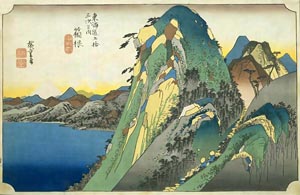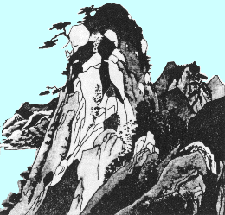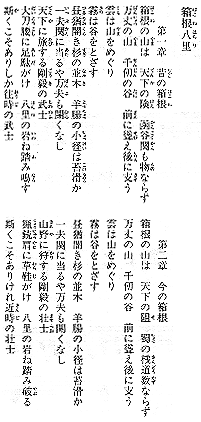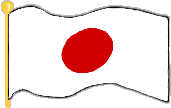箱根八里

箱根八里
Hakone Mountains
Traditional Song
Traditional Song
(Japanese)
(English)
第一章 昔の箱根
箱根の山は 天下の険
函谷関も 物ならず
万丈の山 千仞の谷
前に聳え 後に支う
雲は山をめぐり 霧は谷をとざす
昼なお闇らき 杉の並木
羊腸の小径は 苔滑らか
一夫関に当たるや 万夫も開くなし
天下に旅する 剛毅の武士
大刀腰に 足駄がけ
八里の岩根 踏み鳴らす
かくこそありしか 往時の武士
第二章 昔の箱根
箱根の山は 天下の阻
蜀の桟道 数ならず
万丈の山 千仞の谷
前に聳え 後に支う
雲は山をめぐり 霧は谷をとざす
昼なお闇らき 杉の並木
羊腸の小径は 苔滑らか
一夫関に当たるや 万夫も開くなし
山野に狩する 剛毅の壮士
猟銃肩に 草鞋がけ
八里の岩根 踏み破る
かくこそありけれ 近時の壮士
Part I - Old Hakone (around 1800)
The Hakone Mountains are the steepest place in the world
More so than Kankokukan* - there's no comparison.
Very high mountains with a bottomless ravine**
Rising in the front, shored up in the rear,
Clouds are on the mountains, fog circles, and the dales fill up,
Even during the day, the rows of cedar trees are dark
The narrow path of moss is smooth, like the bowels of sheep
Like a one man-controlled pass even 10,000 people cannot break through
Samurais with pluck going to travel the world,
Long sword at the waist, wearing clogs,
Treading strongly on settled rocks at eight-ri (31.2 k)***,
Supposedly it was like this at the time of the samurais.
Part II - Present Hakone (around 1900)
The Hakone Mountains are the steepest place in the world
The plank bridge of Shoku**** is no comparison
Very high mountains with a bottomless ravine
Rising in the front, shored up in the rear,
Clouds are on the mountains, fog circles, and dales fill up,
Even during the day, the rows of cedar trees are dark,
The narrow path of moss is smooth, like the bowels of sheep
Like a one man-controlled pass, even 10,000 people cannot break through
A brave man with pluck goes hunting around the mountains and fields
Shotgun on shoulder, wearing straw sandals,
Trampling on settled rocks at eight-ri (31.2k),
A brave man must be like this at this time.
Notes
*Kankokukan [Han-Gu-Guan] is a Chinese place name that was very hard to pass through.
**This part is an exaggerated expression.
***Regarding "Eight-ri" - The literal translation of the title is "Hakone Eight-ri". "Ri" is a Japanese distance unit equal to 3.9 km, so "eight-ri" means 31.2 km. In order to understand the meaning of eight-ri in the title and in the song you first need to know about the 53 Stations of the Tōkaidō. These were rest stops along the Tōkaidō (an important route connecting Tokyo to Kyoto during the Edo period in Japan). They were government stations where travelers had to stop and show their traveling permits. The distance from the Odawara to the Hakone Station was 15.6 km. And the distance from the Hakone to the Mishima station was 15.6 km. So total was 31.2 km of steep mountain road.
****Skoku=Chinese place name
*****
The following translation was sent to us by the Japan Information and Culture Center, a part of the Embassy of Japan. This English version fits the tune. Please enjoy singing the sing using these words...
Hakone Mountains hard to cross,
The mighty fortress lies right here,
High up in the ranges, deepest in the dales,
Rising in front, peaking in the rear,
Oh, clouds around the tops, oh, mist fills the vales,
How dark are the cedar woods, huge trees in rows and rows,
See, the narrow winding lane that shines with moss,
Only the strongest man can keep the whole fortress from foes,
Bravest warriors who go on the road
Might have trod the rocks and ranges,
Trampling, climbing all out of the way,
Was it in this way they traveled in those days?
Hakone Mountains hard to cross,
The mighty fortress lies right here,
High up in the ranges, deepest in the dales,
Rising in front, peaking in the rear,
Oh, clouds around the tops, oh, mist fills the vales,
How dark are the cedar woods, huge trees in rows and rows,
See, the narrow winding lane that shines with moss,
Only the strongest man can keep the whole fortress from foes,
Bravest hunters who chase in the hills
With their hunting guns on their shoulders,
Trampling, climbing all out of the way,
Was it in this way they hunted in those days?



Comments
Japanese Pronunciation:
はこね(Hakone)はちり(hachi-ri)
はこねの(Hakone-no) やまは(yama-wa)てんかの(tenkano)けん(ken)
かんこくかんも(Kankokukan-mo) ものならず(mononarazu)
ばんじょうの(banjyo-no) やま(yama) せんじんの(senjin-no)たに(tani)
まえに(mae-ni)そびえ(sobie) しりえに(sirie-ni)ささう(sasau)
くもは(kumo-wa)やまを(yama-wo)めぐり(meguri) きりは(kiri-wa)たにを(tani-wo)とざす(tozasu)
ひるなお(hiru-nao) くらき(kuraki) すぎの(sugi-no) なみき(namiki)
ようちょうの(yochoh-no) しょうけいは(shoukei-wa) こけ(koke) なめらか(nameraka)
いっぷかんに(ippukan-ni) あたるや(ataruya) ばんぷも(banpu-mo) ひらくなし(hiraku-nashi)
てんかに(tenka-ni) たびする(tabi-suru) ごうきの(gouki-no) もののふ(mononofu)
だいとう(daitou) こしに(koshi-ni) あしだ(ashida) がけ(gake)
はちりの(hachi-ri-no) いわね(iwane) ふみならす(fuminarasu)
かくこそ(kaku-koso) ありしか(arishika) おうじの(ouji-no) もののふ(mononofu)
はこねの(Hakone-no) やまは(yama-wa)てんかの(tenkano) そ(so)
しょくの(shoku-no) さんどう(sando) かずならず(kazu-narazu)
ばんじょうの(banjyo-no) やま(yama) せんじんの(senjin-no)たに(tani)
まえに(mae-ni)そびえ(sobie) しりえに(sirie-ni)ささう(sasau)
くもは(kumo-wa)やまを(yama-wo)めぐり(meguri) きりは(kiri-wa)たにを(tani-wo)とざす(tozasu)
ひるなお(hiru-nao) くらき(kuraki) すぎの(sugi-no) なみき(namiki)
ようちょうの(yochoh-no) しょうけいは(shoukei-wa) こけ(koke) なめらか(nameraka)
いっぷかんに(ippukan-ni) あたるや(ataruya) ばんぷも(banpu-mo) ひらくなし(hiraku-nashi)
さんやに(sanya-ni) かりする(kari-suru) ごうきの(gouki-no) ますらお(masurao)
りょうじゅう(ryouju) かたに(kata-ni) わらじ(waraji) がけ(gake)
はちりの(hachiri-no) いわね(iwane) ふみやぶる(fumiyaburu)
かくこそ(kaku-koso) ありけれ(arikeri) きんじの(kinji-no) ますらお(masurao)

Many thanks to HAMADA Miwa and team at the University of Toyama for allowing me to use the Hakone Hachiri recording and midi from their wonderful site of Japanese Songs. On their site you'll find the Japanese lyrics to many Japanese children's songs and folk songs. You'll find transliterations of the songs, recordings, midis and sheet music. Thanks also to Prof. Dr. Tsutomu Anayama for singing this song!

Thanks!
Thanks!
Thanks!
Thanks and Acknowledgements
Thanks to Sadao Mazuka for the pronunciation and for help with the 1st translation (done with Lisa). Many thanks to the Japan Information and Culture Center, a part of the Embassy of Japan, for contributing this song, the 2nd translation, the 2nd illustration and musical score. Thanks also to Kiara Kyo for the Romaji lyrics to "Hakone Mountains". 1st image is "Hakone-juku" in the 1830s, as depicted by Hiroshige in "The Fifty-three Stations of the Tōkaidō".
Arigato gozaimasu! 


























